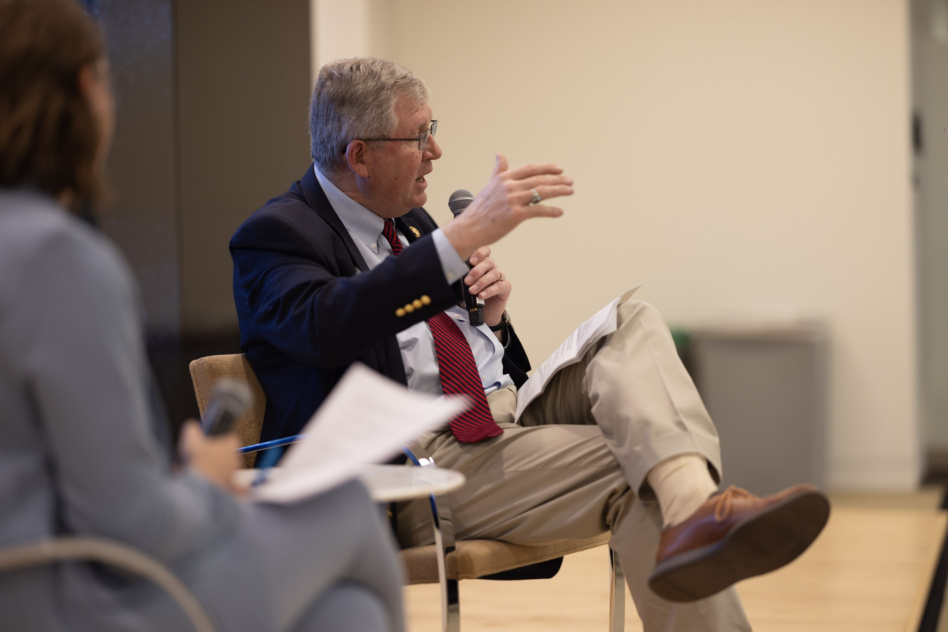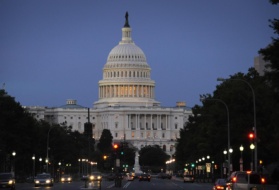Senior officials from the administration and Capitol Hill defended dueling plans to regulate novel space activities at Payload’s Space Capitol III event on Monday night.
The FAA’s take: Kelvin Coleman, the FAA’s associate administrator for commercial space transportation, went to bat for the National Space Council’s proposal to split mission authorization responsibilities between the Commerce Department and FAA, arguing that it best leverages existing knowledge within both offices.
“We debated and talked about the fact that transportation probably should reside with [the] Transportation [Department] because there’s expertise there,” he said. “We do launch and reentry and we don’t have current authority for the in-space portion of that, but there’s expertise that’s already in place.”
From the GOP: On the second panel of the evening, Rep. Frank Lucas (R-OK), who chairs the House Science, Space, and Technology Committee argued for his own plan laid out in the Commercial Space Act of 2023, which would give all responsibility to the Commerce Department, saying that he believes Commerce can simply move faster and help grow the space industry—and he’s willing to bide his time to make sure his plan is the one that sticks.
“Taking advantage of the circumstances is in our best interest…but I would suggest this: If I have to wait somebody out to get the right bill, I have a little bit of patience, I’ve got a little bit of time,” he said.
Lucas, who also talked about attaching his plans to other legislation moving through Congress like a learning period extension or appropriation bill, said he had asked the White House to share its proposal for commercial space ahead of dropping his own bill, but couldn’t make progress. Then, shortly after scheduling a markup, the administration rolled out its plan, leading to the dueling proposals.
What goes up: The FAA requested $57B in the fiscal 2025 budget request, a 36% increase from the funding it got in fiscal 2024. That additional money will support hiring more people to process applications, developing expertise around human spaceflight for whenever the learning period ends, and getting ready to potentially take on more responsibility around mission authorization.
The FAA’s space office has taken some flack from Capitol Hill, where some lawmakers have criticized the FAA for taking too long to issue launch licenses and limiting how quickly industry can iterate. Coleman’s message to lawmakers was clear: If you want us to move faster, fund us.
“We are viewed sometimes as the long pole in the tent. If you want that pole to be shorter, you have to look at funding our office,” he said.
Must come down: Lucas lamented the NASA budget proposal cuts for fiscal 2025, adding that he’s working to hold hearings to make sure his colleagues understand the resources the space agency needs. He also urged the administration to request higher funding—“the real numbers that are necessary” for big ticket items including Artemis.
“Whether it is space or science, had I had my druthers, I would have spent more,” he said.
The Starship in the room: We asked Coleman about the agency’s next steps after Starship’s third orbital flight test last week, which ended in a mishap even though it was far more successful than previous missions. Once SpaceX conducts its mishap investigation and provides a report to the FAA—a process that could take a few weeks— it’ll be up to the FAA to issue a modified license for its next flight.
“We didn’t see anything major. We don’t think there’s any critical systems for safety that were implicated,” Coleman said. “Usually if there’s not any critical systems for safety implicated, the mishap investigation can be pretty clean and it can move pretty quickly.”
Coleman also said the agency is working to ease the launch approval process as SpaceX looks to launch six to nine more Starship flights this year. ”We’re trying to work with them to get them on a different program if you will in terms of how we approve their launches going forward,” he said. “We want to get away from the launch by launch approvals and get more into what Part 450 was really designed for, which is an approval of a portfolio of launches.”
High hopes: In addition to his commercial space bill, Lucas is also pushing for Congress to pass a new NASA authorization bill. Asked how he intends to get these bills on the floor in a busy election year, Lucas said he’ll make the case that passing space legislation will give lawmakers some wins to discuss with voters.
“My pitch to leadership is at the conclusion of this two year session of Congress, we have to have some things that are good policy, that move the country forward, that we can all talk about,” he said. “It can’t be just how we barely appropriated money to fund two cycles of government.”




